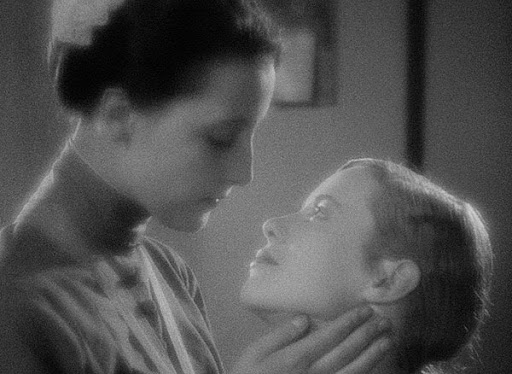One of the most remarkable aspects of Leontine Sagan’s Madchen in Uniform is its time period, appearing in Germany in 1931, at the beginning of the rise of the Nazis and the increasing conflict between the freer social and cultural elements of Weimar Germany and the codification of nationalism and “Prussian” pride that would eventually lead to the Third Reich. And it’s hard not to read at least some of that into the film, which, filtered via lesbian themes, addresses the cruelty of the German educational system and criticizes regimentation, militarism, and authoritarianism as antithetical to learning, development, and the progress of the soul.
Based on the play by Christa Winsloe, Madchen in Uniform follows Manuela von Meinhardis (Hertha Thiele), a new girl at a boarding school run by the implacable headmistress Fräulein von Nordeck zur Nidden (Emilia Unda). The school is primarily for the daughters of soldiers, and the headmistress attempts to instill regimentation and privation in the girls, both to cut costs and to break their individuality. Arrayed against her is Governess Fräulein von Bernburg (Dorothea Wieck), who attempts to give the girls the care, understanding, and physical affection that they so crave. The girls themselves are divided among those who have fallen under von Bernburg’s influence and those who align with the headmistress. Manuela begins to fall in love with von Bernburg, who recognizes her attraction.
The undercurrent of the conflict is between authoritarianism and love, privation and sensuality. That it is couched in a battle between women, about girls, develops the film’s inherent subversion—love, represented by von Bernburg, is sensual and romantic (in the both the lowercase and capitalized sense), and Manuela’s attraction is as much as about sensuality as it is about the desire for a mother’s affection. One of Manuela’s classmates, Ilse, hides pictures of a matinee idol in her locker; other girls develop crushes on von Bernburg, the only member of the faculty to show them affection. The nascent sexuality of the girls in an all-girls school becomes an ideological battleground between authoritarianism and enforced heterosexuality, and freedom and fluid sexuality.

Madchen in Uniform equates same-sex desire with resistance to authoritarianism, especially when it’s not sanctioned via performance of gender. The girls perform Schiller’s Don Carlos, with girls (of course) taking male roles. The performance earns them the praise of the headmistress and other teachers—within the sanctioned gender roles, where girls play boys in a play, demonstrating same-sex desire is acceptable (and, in itself, subversive, given the history of theater). Then Manuela, drunk on too much punch, declares her love for her teacher, and reveals that von Bernburg loaned her a petticoat. The violation—same-sex desire has moved out of formally sanctioned theatrical space and into reality—prompts the headmistress to condemn her, and pushes the film towards its final conflict.
The film’s project, of course, evades some of the problematics of girls developing infatuations or falling in love with their teachers, and their teachers encouraging or even reciprocating those crushes—this is explored more thoroughly in Olivia, very much Madchen in Uniform’s sister film—and there is an undercurrent that the girls are looking for mother figures as much as lovers (if one were to apply a Freudian analysis to Madchen, here we’d have one interesting breaking of the Oedipal theory). Men and male society is far away, hardly a feature in the girls’ lives—they mention their fathers, put up pictures of matinee idols, and the headmistress dreams of how these girls will raise “the next generation of soldiers” (a rather distressing concept, given the time period). But the conflict, desire, and comradery is between girls and women—there are the women like the headmistress, who enforce their power via privation and regimentation, and women like von Bernburg, who try to provide sympathy, education, and an outlet for adolescent energy.
Sagan draws some influence from the Expressionists and makes copious use of point of view shots and canted angles, especially when it takes on the perspective of Manuela and her slow breakdown. The camera places the viewer in the position of an adolescent girl experiencing the passion and pain of first love, indicating just how important (and thin on the ground) films focalized through female adolescence are. The result is a film that pushes back against burgeoning authoritarianism, a seminal work of LGBTQ+ cinema, and a powerful ideological argument in its own right.
Madchen in Uniform is now available on Blu-ray from Kino-Lorber.

